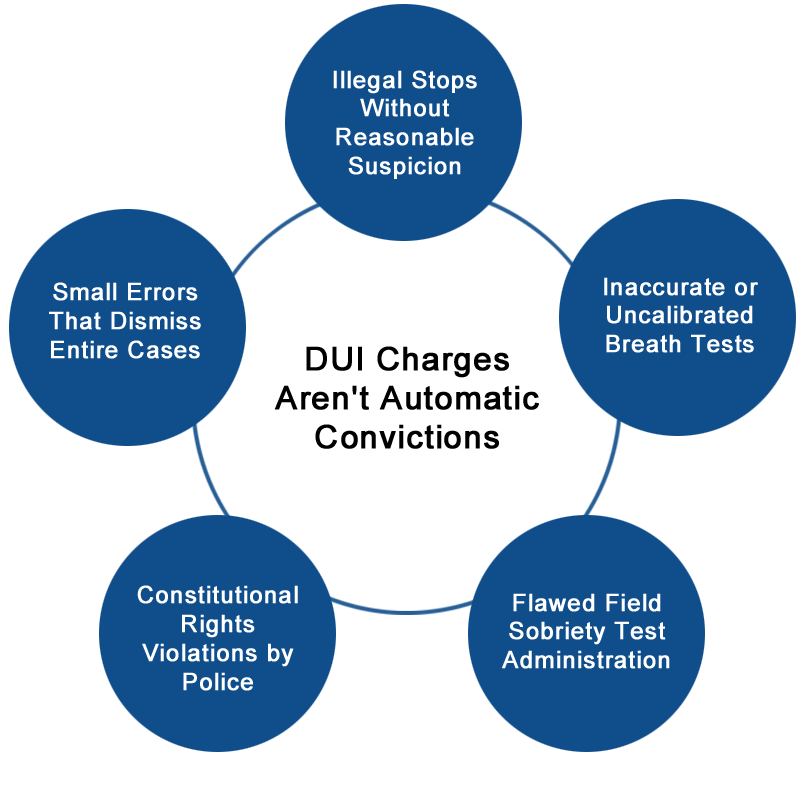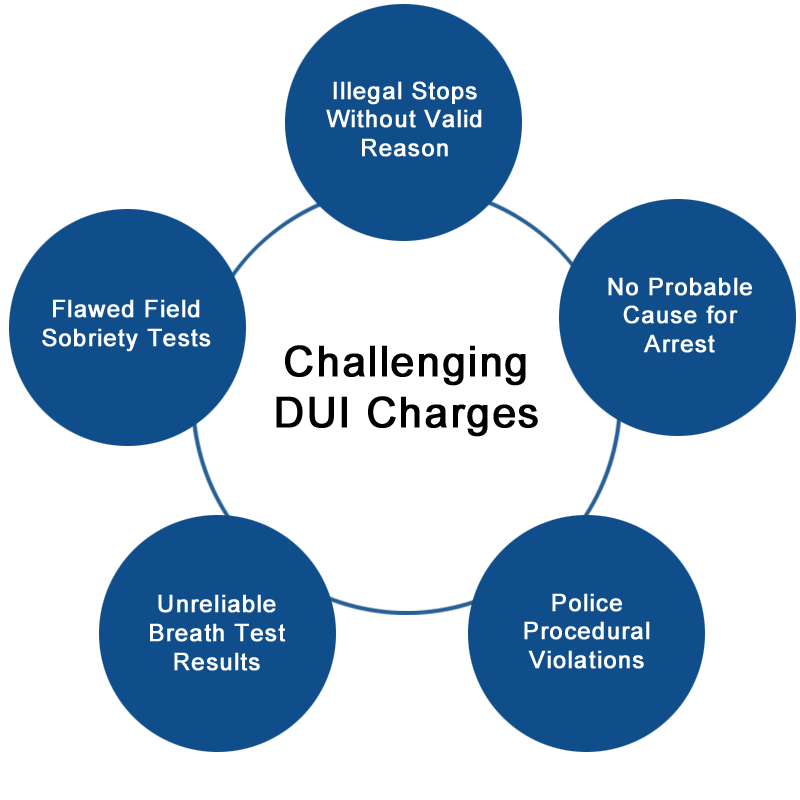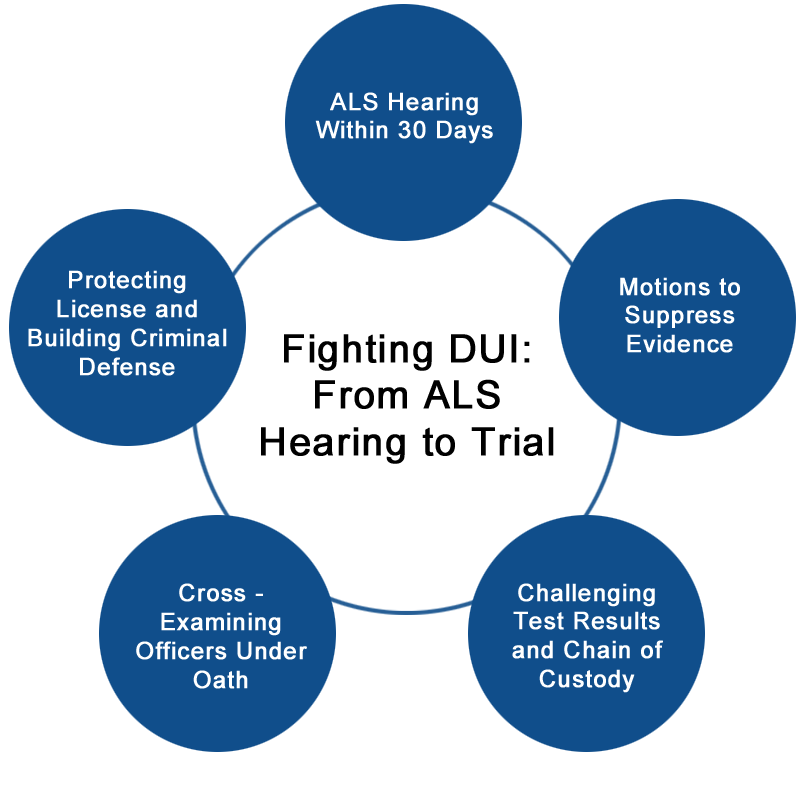
At Zeliff | Watson, our purpose is clear. We help clients take back control of their lives, restore their reputations, and move forward without the shadow of a DUI arrest. Many people assume a DUI case cannot be fought. They believe that if they blew over the limit or stumbled during roadside tests, a conviction is guaranteed. That is not the reality. Breath tests can be inaccurate, field sobriety tests are designed to make drivers fail, and police often make mistakes that violate constitutional rights. Even a small error can be enough for a case to be dismissed.
Consider these examples:
- A client was the victim of an illegal stop due to a lack of reasonable suspicion. Because officers cannot pull someone over based only on a hunch, the stop was unlawful. As a result, all evidence was thrown out and the DUI case was dismissed.
- A driver failed a breath test, but it was later revealed the device had not been properly calibrated. The charges were dismissed.
- Another client was stopped and given poorly administered field sobriety tests. The mistakes made the results inadmissible in court, and the charges were reduced to reckless driving instead of DUI.
How to Beat a DUI Charge in Georgia
With a proven record of thousands of successful DUI cases, Zeliff | Watson has built its reputation on identifying flaws in the prosecution’s evidence and leveraging them to achieve favorable outcomes. From challenging unreliable test results to uncovering critical procedural errors, our attorneys have decades of experience showing courts why charges should be reduced or dismissed. Every flaw matters, and we know how to find them.
While many attorneys guard their defense strategies, at Zeliff | Watson we have one goal: securing the best outcome for you. That means fighting for a dismissal of your DUI charge, negotiating a reduction, or winning a full acquittal at trial.
There are hundreds of ways to challenge a DUI case, and every strong defense begins with the most common but often overlooked strategies.
These include:
Illegal Stop
An illegal stop or lack of reasonable suspicion happens when police pull someone over without a valid reason. Officers must be able to point to specific facts such as swerving or a broken taillight rather than relying on a hunch. If the stop was unlawful, all evidence collected afterward including field tests, breath tests, and even the arrest itself can be thrown out, which may result in the DUI case being dismissed.
No Probable Cause to Arrest
Probable cause means the officer must have enough clear facts to reasonably believe you were driving under the influence before making an arrest. This can include observations like slurred speech, the smell of alcohol, or failing field sobriety tests. If the officer lacked probable cause, the arrest may be invalid and the evidence gathered after it can be excluded, which can lead to dismissal of the DUI case.
Procedural Violations by Law Enforcement
When police make a DUI arrest, they must follow strict procedural steps for the arrest to be valid. These steps include having a lawful reason for the traffic stop, establishing probable cause before making the arrest, properly reading the implied consent notice, giving Miranda warnings when required, and handling breath or blood tests according to set rules. If any of these steps are skipped or done incorrectly, the evidence gathered can be challenged in court.

Breath Test Issues
Flawed breath tests occur when the device used to measure blood alcohol levels is not working correctly or is mishandled. In Georgia, these machines must be regularly calibrated and operated properly, but problems such as missing maintenance records, operator errors, or medical conditions like GERD can make results inaccurate. If the test results are unreliable, they may be thrown out, which can lead to a dismissal or reduction of DUI charges.
Flawed Field Sobriety Tests (FSTs)
Flawed field sobriety tests occur when roadside tests such as the walk-and-turn or one-leg stand are used as evidence of impairment even though they are highly subjective. Conditions like poor weather, uneven pavement, medical issues, or unclear instructions can make sober drivers appear impaired. Highlighting these flaws can weaken the prosecution’s case and may result in the evidence being excluded.
Medical Conditions and Health Problems
Medical conditions and health issues can be powerful defenses in a DUI case because they often create signs that mimic impairment. Conditions such as acid reflux, diabetes, neurological disorders, or injuries can cause slurred speech, balance problems, or even trigger inaccurate breath test results. This means that failing a breath test or field sobriety test does not always prove a driver was impaired, since there are many possible medical explanations. When these conditions are documented and demonstrated, the evidence can sometimes be excluded, which may lead to a dismissal or reduction of the charges.
In addition to diagnosed medical conditions, everyday health problems can also play a role. Fatigue, dehydration, anxiety, or side effects from prescription and over-the-counter medications can affect balance, speech, and reaction time. These symptoms can make a sober driver appear impaired and even cause poor performance on sobriety tests. Showing that health problems, rather than alcohol or drugs, were responsible for the officer’s observations can create reasonable doubt and strengthen the defense.
Blood Testing Issues
Blood test and chain of custody issues are critical in a Georgia DUI case because even small mistakes can make the results unreliable. The sample must be properly collected, labeled, stored, and tested under strict procedures. If it is left unrefrigerated too long, damaged or contaminated during transport, or mishandled by the lab, the accuracy of the results can be compromised.
Beating a DUI in Georgia Starts with Preparation
In the courtroom, the side that is best prepared has the greatest chance of success. At Zeliff | Watson, our attorneys approach every DUI case with a deeper command of the facts than both the prosecutor and the arresting officer. We focus on exposing errors, challenging weak evidence, and presenting your story in the most compelling way to give you the best chance of having your charges dismissed, reduced, or acquitted. Our goal is to help restore your freedom, your reputation, and your peace of mind.
Legal Tactics Used to Beat DUI Charges

In a Georgia DUI case, there are several legal mechanisms an attorney can use to challenge the evidence. One of the most common is filing a motion to suppress, which asks the court to exclude evidence obtained through an illegal stop, a lack of reasonable suspicion, or insufficient probable cause for arrest. Attorneys may also file a motion to exclude evidence when field sobriety tests are flawed, breath test results are unreliable, or medical conditions could have caused signs that mimic impairment. Another powerful strategy is to challenge the Implied Consent procedures or Miranda warnings, which can lead to the suppression of statements made by the accused.
Defense attorneys also frequently demand calibration and maintenance records for breath test devices to determine whether the results are admissible. Similarly, they can challenge the chain of custody of blood samples, questioning whether the evidence was properly collected, labeled, transported, and tested. During trial, attorneys may object to the introduction of testimony or evidence that was improperly obtained or lacks proper foundation. Finally, they can request independent testing of blood samples to dispute the accuracy of the state’s laboratory results.
Together, these strategies form a comprehensive defense roadmap, giving the accused multiple opportunities to weaken the prosecution’s case and increase the likelihood of dismissal or reduction of charges.
The Value of the ALS Hearing in Beating a Georgia DUI
The Administrative License Suspension (ALS) hearing is one of the most powerful tools in fighting a DUI in Georgia and protecting your ability to drive. After a DUI arrest, your license is automatically at risk of suspension, but you have the right to challenge that suspension. To do so, you must request the ALS hearing within 30 days of your arrest. Failing to act within this window can result in an automatic suspension, even before your criminal case is heard.
At the hearing, your attorney can fight to keep your license by cross-examining the arresting officer under oath, challenging the stop and arrest procedures, and exposing weaknesses in the State’s case. Most clients at our firm regain their ability to drive because we often win at this stage. More importantly, the ALS hearing provides valuable insight into how the prosecution will approach the case, allowing us to prepare a stronger defense.
When you are arrested for DUI, you actually face two battles: the administrative license suspension and the criminal DUI charge. By focusing first on the ALS hearing, we work to protect your license and driving privileges while also laying the groundwork to beat the criminal case. What we learn here often provides the advantage needed to achieve a favorable outcome.
Schedule a Free DUI Case Evaluation
Zeliff | Watson offers free, no-obligation DUI consultations so you can speak directly with our experienced defense team and understand your legal options. These meetings are completely confidential, often last an hour or more, and can be conducted in person, online, or over the phone.
During your evaluation, you will have the opportunity to ask questions, explain your concerns, and receive legal guidance. Our team will begin gathering critical details and evidence, evaluate the circumstances of your arrest, and start developing a defense strategy to fight your DUI charge. After the consultation, we move quickly to review police reports, request any video evidence, and begin building your defense. At that time, we will also provide a fee quote so we can start defending your case without delay.
To begin, simply complete the contact form below to connect with our team.
A Simple Process to Getting Started

Schedule a Free Case Evaluation
Schedule a free, no-obligation, and confidential case consultation in person, online, or over the phone. This will help you understand how your case can be challenged, potentially leading to a reduction, dismissal, or acquittal of your charges. Click here to schedule your case evaluation.

Meet Our Defense Team and Conduct a Case Evaluation
During your free case evaluation, you’ll have the opportunity to ask questions, receive answers and legal guidance, and collaborate with our attorneys to better understand your side of the story, gather evidence, and devise a strategy to achieve the best possible outcome for your pending criminal charges.

Start Defending Your Case
After your free case evaluation, Zeliff & Watson will assist in preserving evidence and safeguarding your rights, ensuring your protection throughout the process. The defense team will also provide a proposed fee to represent your case, with the goal of achieving the best possible outcome.

